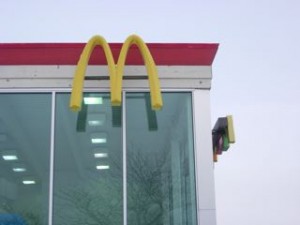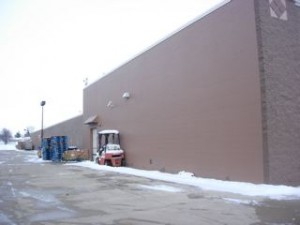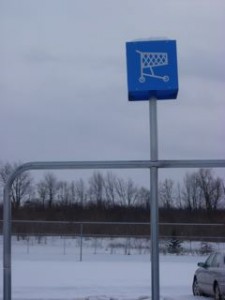 The Kalamazoo Gazette for Wednesday 30 December 2009 had a front-page article with the headline “Bill to allow WMU business park expansion is on governor’s desk.” In it we learned that “WMU leaders hope to expand the Business Technology and Research Park to the 55-acre Colony Farm Orchard property….”
The Kalamazoo Gazette for Wednesday 30 December 2009 had a front-page article with the headline “Bill to allow WMU business park expansion is on governor’s desk.” In it we learned that “WMU leaders hope to expand the Business Technology and Research Park to the 55-acre Colony Farm Orchard property….”
But do they? WMU has claimed that it wants and needs the Colony Farm Orchard for such expansion and has repeatedly implied that this is what it will do with the land. Furthermore, its lobbyists and other spokesmen have sold House Bill 5207 to the legislature and the governor by claiming that it is a jobs bill. Passing it, they say, will allow WMU to create jobs and fuel economic growth with an expanded BTR park.
The whole process has been a commentary on how WMU and Michigan–and perhaps other universities and states–have lost their way. WMU could use the land for education, for research, for service–the three touchstones of a university’s role in our society–without any need for shenanigans in the legislature. Instead it ignores these public uses and stakes its claim on job creation and feeding the local private economy.
The “This-park-grows-jobs” hot air has, in fact, been a successful ploy. Some legislators may have believed the claims, and some that didn’t may have concluded there was no political risk to going with the flow. Both houses of the legislature passed HB 5207 by large margins. The bill is awaiting the governor’s attention. We may soon learn Governor Granholm’s reaction, or we may not; it’s possible she may let it become law without signing it.
HB 5207, of course, has nothing to do with jobs or with a BTR park. What it does is strip a legislatively imposed restriction from the Colony Farm Orchard, land bought with tax-payer dollars. The 1977 conveyance from the state provides that “Western Michigan University may utilize the property solely for public park, recreation, or open space purposes, except that the legislature, by statute, may authorize Western Michigan University to utilize the property for some other public purpose.” HB 5207 written for WMU and introduced in the House by Representative Bob Jones (D-Kalamazoo) requires the state to buy the Colony Farm Orchard from WMU for $1, remove the restriction, and sell it back to WMU for $1.
As introduced, the bill included a new restriction that required WMU to use the land to expand the BTR park and provided that in the event of activity inconsistent with this restriction the state could take the land back. But when the bill came out of Representative Jones’s committee, that language was gone. The only restriction remaining in the bill sitting on the governor’s desk is that any arrowheads or other aboriginal antiquities that are found belong to the state. In other words, if the bill becomes law, WMU can do anything it wants with the land. It does not have to be used for a BTR park; it does not have to be put to public use. It can be used for anything.
 Based on WMU’s rhetoric, a restriction that the land be used to expand the BTR park was quite logical. Its quick disappearance is one line of evidence suggesting that WMU does not plan to use Orchard this way now, if it ever did.
Based on WMU’s rhetoric, a restriction that the land be used to expand the BTR park was quite logical. Its quick disappearance is one line of evidence suggesting that WMU does not plan to use Orchard this way now, if it ever did.
WMU’s language about its plan for the Orchard has always been fuzzy. The Colony Farm Orchard and the glorious achievements of the BTR park have regularly been mentioned in the same breath, but in retrospect the absence of a firm connection is striking. At no time have we heard WMU say, “When the restrictions are removed, we will expand the BTR park onto the Colony Farm Orchard”. Here are a few quotes from WMU administrators:
Bob Miller, 24 February 2009, “The BTR has been a wonderful success, and we are looking at a possible expansion. No decisions have been made. The Orchard property… is an option. But at this point, it’s premature to even assign a timetable to it.”
Bob Miller, 26 February 2009, “There are no plans to develop that area [Colony Farm Orchard], but it is one of the options we are looking at…. I can tell you, should a decision be made to expand the Business, Technology and Research Park, we would come to you, to the entire community with our plans and share them. [But] we have none.”
John Dunn, 23 September 2009, “Our park is vibrant and full, and more than 1,300 jobs have been directly or indirectly created by its presence….We urge our lawmakers to vote for removal of the restrictions. Then, when the time is right in the coming months or years, we can move appropriately to expand our job-generating BTR Park.”
Why might WMU not want to expand the BTR park onto the Orchard land? There are a number of possible reasons. As many of us have pointed out, it has always been a poor choice.
- For one thing, it’s too small. It might be big enough for three new tenants, but three lots are still vacant in the old BTR park and the temporary soccer fields could hold at least two more.
- About a third of the Orchard site, the section where the fruit trees themselves are located, very likely has soil contaminated with lead and arsenic from the fruit-growing practices of the period from the 1880s through the early 1940s. Development that involved excavating, grading, or other soil disturbance would probably require expensive remediation–hauling off several inches of top and subsoil to a toxic waste dump and bringing in clean replacement soil.
- Michigan State University has a lease on the land allowing it to conduct experimental research on pest insects. WMU is proposing to buy MSU out over a period of three years for up to $985,000. Why WMU negotiated such an unfavorable deal is one of many puzzles in this process. As far as I can tell no one in the WMU administration asked any of the professional entomologists or ecologists on the faculty to look into the experimental pest insects research. For example, is there still an experimental component to whatever MSU is doing there?
The Colony Farm Orchard is deficient for BTR park expansion in many ways. Several alternative sites are larger, definitely uncontaminated, not the subject of a prior lease, and a better fit otherwise.
WMU’s talk about the vibrant, wonderful performance of the BTR park whenever the subject of the Colony Farm Orchard came up now looks–and smells–like a red herring. What, I wonder, does WMU really have in mind for this 53 acres, its old apple trees and grape arbors, its bur oaks, red foxes, wild turkeys, and bluebirds.
There are probably still a couple of days to get your recommendation for the Colony Farm Orchard to the governor. Phone calls would probably be best, email next.
Contact information for Governor Jennifer Granholm:
Phone: (517) 373-3400
Phone: (517) 335-7858 – Constituent Services
Fax: (517) 335-6863
PO Box 30013
Lansing, MI 48909
Here is a link to an email citizen opinion forum.
Here is a link to the governor’s standard email.